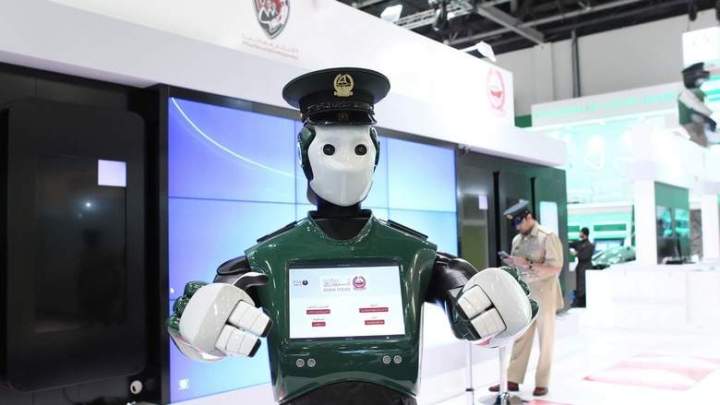
Firefighters with jetpacks
The saying “fight fire with fire” doesn’t mean much in Dubai. Instead, they prefer to do their firefighting with jetpacks.
That’s thanks to a deal between Martin Aircraft and the Dubai Civil Defense (DCD), which involves rolling out a number of custom $35k water-powered jetpacks, which can be used to put out fires along the city’s extensive shoreline. The device allows the firefighters to get a better vantage point for extinguishing blazes, as well as dodging the traffic.
Autonomous drone taxis
While most cities are still caught up wondering about regular self-driving cars, Dubai is busy putting self-driving flying cars through their paces. Given a test flight last month, Dubai’s the Autonomous Air Taxi (AAT) is described as the world’s first “self-flying taxi service.”
Although it’s not yet available commercially, the 18-rotor flying drone promises to be the eco-friendly, electrically-powered transportation solution of tomorrow — so long as you don’t want a flight longer than 30 minutes, that is!
The hotel of the future
Planning a trip to Dubai next year, and looking for somewhere high-tech to stay? If so, you might want to check into the Rosemont Five Star Hotel & Residences. Still in development at the time this article was written, the 450 room hotel boasts a high end restaurant, manmade beach, giant aquarium, infinity pool, and more.
The reason the hotel made this list, though? Giant 36-degree computer-generated rainforests in the public areas, and a robotic host on the reception desk. It’s like you’ve gone on holiday to the future.
A real life robo-cop
Less smiley, but just as metallic as the robot host at the Rosemont Five Star Hotel is Dubai’s latest law enforcement officer. The first robot cop was introduced this summer, complete with a camera for transmitting live images and identifying suspects, and a touch screen which can be used by members of the public to report crimes and ask questions. According to the Smart Services division of the Dubai police, such humanoid robots will make up an entire quarter of the local police force by 2030.
Autonomous police cars
Not content to just have humanoid robot cops on the street, Dubai has also signed an agreement with Singaporean startup called OTSAW Digital to introduce self-driving cop cars. The “cars” themselves are more like a child’s pedal car in size, and have a top speed of just 9.3 mph, but they boast the same LIDAR and sensing technology as larger autonomous vehicles. Most importantly, they can act as portable surveillance systems to search for wanted individuals or vehicles, or suspicious objects left unattended.
Mega solar plant
Having last month received a contract to build yet another extension, Dubai’s Mohammed bin Rashid Al Maktoum Solar Park will eventually stretch to cover a massive 83 square miles, making it the world’s largest single-site solar park.
As if that wasn’t enough of a record breaker, it will also soon boast an enormous 260-meter (853-foot) solar tower, the tallest in the world. It’s a key ingredient in the Dubai Clean Energy Strategy 2050, which aims to increase the share of clean energy in the city to 7 percent by 2020, 25 percent by 2030, and a massive 75 percent by 2050.
Plus, it totally looks like the HQ for a future James Bond villain!
The Red Planet on Earth

Just when you think Dubai is out of ideas, you hear about plans to build an enormous “space simulation city” that will offer up, “a viable and realistic model to simulate living on the surface of Mars.”
With a budget of $135 million and a footprint stretching to 1.9 million square feet, the Mars Science City will simulate as closely as possible the conditions of a real life Mars colony — complete with greenhouses for testing out agricultural techniques, solar radiation-blocking 3D printed walls, and far more.
It’s all part of a plan for the United Arab Emirates to send its first unmanned probe to Mars in 2020, and establish a colony there sometime in the next century.
The tallest building in existence
What kind of super city of the future would Dubai be without laying claim to the world record for world’s tallest skyscraper? The Burj Khalifa stands at a whopping 2,722 feet, giving it a comfortable 700 feet on the second highest building in the world.
A great example of Neo-futurism that could come straight out of the world of Blade Runner, the Burj is an angular masterpiece of engineering which contains a luxury hotel, observation decks, apartments, corporate offices, restaurants, observatories, and the world’s highest nightclub. Not to be missed. Unless you’re terrified of heights, we guess.
Iced coffee delivered by drone on the beach
When you think about the kind of optimistic future promised to us by (some) science fiction writers, what could sound more utopian than a drone descending from the heavens to deliver you an iced coffee while you’re lounging on the beach?
That’s something Costa’s Jumeirah Beach Drive-Thru store trialled earlier this year in the swanky Kite Beach area of Dubai, with its niftily-named Coffee-Copter. While there’s no guarantee that this becomes a permanent fixture of the beach scene, it speaks volumes about Dubai’s zany innovation that this was even trialled.






